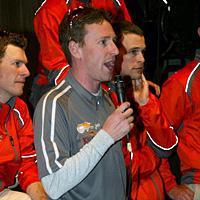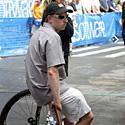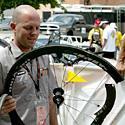
Recently on Cyclingnews.com |
An interview with Jittery Joe's manager Micah Rice, March 7, 2005
Movin' on up
Bean Team director adds new sponsor and riders
The coffee-financed team from Athens, Georgia has an additional sponsor and bigger roster for 2005. Team director Micah Rice told Mark Zalewski about his management philosophy and plans for the team.
If you drew up a list of paths to the American dream of fame and fortune, director of a U.S. Continental cycling team would not be a job high on the list -- especially in the fortune department. But when you have a passion for something, fortune is not measured in terms of salary. For Micah Rice, directing the Jittery Joe's team is a labor of love -- beginning with a small regional squad and developing it into a national-caliber team that competes at the highest level of North American road cycling.

|
This year sees the addition of a second title sponsor in fruit energy bar maker Kalahari, and a consequent doubling of the team budget. With this increase in resources, Rice has increased the number of riders on the team and secured a general classification contender in Tim Johnson. But with the increase in support comes an increase in expectations, particularly for the hometown races like the Tour de Georgia.
We kicked off, then, bby talking about the team's new developments for 2005.
Cyclingnews: A lot of changes for this year. Obviously, the new sponsor has allowed for a lot more, but tell us about the impacts of these changes.
Micah Rice: When your entire budget is based upon the sale of coffee, there is only so much you can do. I think we've done well with what we've had in the past years, but the addition of Kalahari is obviously huge for us, because it almost doubled the budget in terms of what I had to play with. We've got a little bit more to work with, more equipment, a few more plane tickets, being able to bring in a few more quality riders -- it's going to make all the difference.
The Louis Garneau thing is great too. They have really bought into our team -- as they say covering us from head to toe. And they are one of the bigger cycling companies in the world, and it's kinda one-stop shopping!
CN: Adding Tim Johnson has really increased your chances on competing in the GC for stage races. What do you expect out of him specifically?
MR: When I got Tim, I originally saw him as a guy who will bring some results to the table. Obviously, his background with Saturn and Suanier-Duval makes him a guy who is looked to for results. But really, the real reason is to be a true team captain. He is going to provide leadership that we really haven't ever had. We've had good leaders, but I think he is going to bring a new level to that. And that will keep a more cohesive team together, and I think that will bring some results.
CN: It seems like you are diverging into two distinct squads, one for stage racing and one for the American bread and butter, crit racing. Is that the master plan?

|
MR: That is how I've built my teams in the past -- built them around one or two people. Teams like Health Net basically buy up all the talent they can and it all sorts itself out. You figure if you have ten of the best guys there, you are going to win. But what I do is bring in two leaders that everyone understands are the leaders. These are the people you are listening to and working for. And I think that gives everyone a little more direction, and they can then concentrate on what they do. So I've built it around Tim for the GC in stage races, and Jeff Hopkins who is one of the fastest guys out there. He didn't do too well last year because of his injury, but he will be back this year.
CN: It's pretty late for a training camp compared to most other teams. Do you think this is a disadvantage for your team, or a strategic move?
MR: I like this time. It moves people straight into the season. A lot of teams have their training camp in January and then everyone goes home and does their own thing until the races. This way I keep in contact with everybody, and then when they come to training camp, it is the beginning of their season. It's the first trip of the year. It works well that way.
CN: Having the riders living relatively close together, or even with each other, was a staple of this program in past years. Is that still the norm?
MR: It used to be like that. Tim moved to Athens which is great. There are three guys living together in Nashville, TN. It used to be everyone lived around here, but that isn't so true anymore. But I like the fact that we base the team out of Athens. It is clear we are from Athens, and we present ourselves as the team from Athens, Georgia. It's is great for the sponsors from here, and it gives it a hometown feel.
CN: What do you see as the races you are hoping for a good result in and which are the ones that need to have a good result for the sponsors/stakeholders?
MR: I think that one of our key races is always Tour de Georgia. It's is basically our hometown race. We are the team from Athens, so everyone looks to us as the hometown heros, so we have to do well for our sponsors and fans. It's a tall order, with the teams that show up to the race! But hey, we thought that last year, and we pulled off a stage win. If we can pull that off again, obviously we are doing something right!
A lot of the stuff we are doing in the early season is in preparation for Tour de Georgia. Going to the Giro del Capo in South Africa will really kick off our season well -- giving us a head start.
CN: Speaking of that stage win on Brasstown Bald last year, how much do you attribute the increase in support to that moment? And is that too much to live up to for this year?

|
MR: I think what happened last year was pretty special. I could not have even hoped for a finish like that, it was such a big deal. I was just thinking it would be really cool to get on the podium one day. And to win that stage, it was one of the biggest wins of the season by any team in the U.S. To beat Lance on the mountain was a big deal!
We were already talking to Kalahari before that. Dave Abrams from Kalahari was riding in the car for the stage that finished in Rome last year, and we were already talking about ideas and how to put it together. But when that happened, we really turned a lot of heads. And the coffee sales really spiked big right after that! And that is how we make our money.
CN: You are headed across the ocean for the first time in a week for the Giro del Capo. Are you nervous at all?
MR: I think it is an early season test. I'm not planning on going over there and killing people -- we'll be going up against some really tough teams there. Obviously, Barloworld is doing just fine and will probably take control pretty quickly. I hope to get some fitness out of it, see where everyone is. I'm not nervous at all because the five guys we are taking have experience. Bruno has a lot of international experience -- he's done a lot of big races with the Canadian national team. Tim, you don't need to say anything about him. Thad is super strong -- raced for Colavita last year. Jonny has been on our team for a while and is ready to make that next step. He has a lot of strong training under his belt. And Evan is one of the new stars -- he is going to have a great year this year.
CN: During the team presentation, you presented the rhetorical question, "Why would anyone want to live like this -- a bike racer making $250 per month?" So how about you answer the same question, why would anyone want to manage a bike team for... well for coffee beans, when you could probably make more doing any number of other things?
MR: In the end, it's the same reason the riders love it, the same reason they put themselves through it. You love the sport, and you are not involved with the sport if you don't love it. To be part of it... in that follow vehicle on Brasstown Bald with the fans screaming and yelling, and over the radio you are hearing, 'Cesar is winning the stage!' driving past throngs of people... to be standing there when Cesar climbs up on the podium with Lance Armstrong and salutes the crowd... that's when it all pays off. Then you realize that you were part of that -- I helped get that guy there.
There were times when it was really hard in the first year of Jittery Joe's when we were just based off the sale of coffee, exclusively with no minimums. There was a sixth month period where I was working sixty hours a week on the team and did not get paid a penny. Fortunately, my then fiance and now wife, has a job as a nurse and she made enough for us both to survive that first year. But I'll tell you, that was a true test of our compatibility! [laughs] She still married me! I pulled it out in the end I guess. She understood that this is something I really love to do and that I'm willing to make sacrifices to do it. Yeah I don't get paid a lot. My wife makes a lot more money than I do, but that's okay. We live comfortably and it is something I love to do.

|
We have a very unique setup with the sponsorship. We don't just have Jittery Joe's and Kalahari as our sponsors. But anyone that goes out to a bicycle shop and buys a bag of our coffee is a sponsor of the team. It's that connection that we really try to push. You can support the Jittery Joe's/Kalahari team, just buy a Fruit Trekker bar, because a portion of that will go directly to help pay Christian Foster's rent or Jesse Lawler's entry to the next race. People can really be a part of our team that way.
Like Navigators Insurance -- how do you support that? Or Health Net? I mean with Colavita, I try to buy Colavita olive oil whenever I get a chance, but it's not a direct relationship. It's still good, but when you buy a bag of Jittery Joe's coffee, you know that two dollars out of the total price is going directly into the team budget. It's similar to what iTeam Nova was a few years ago. If I had [a huge cargo ship] I'd get Navigators Insurance!
CN: Now that you have a more substantial budget, and assuming that this year goes as planned flowing from that, where do you see this program four or five years from now?
MR: The thing with this team is that we don't have some marketing guy in a cubicle somewhere saying, 'Do we sponsor this team again? Do we write this check?' This team goes where the cyclists of America want it to go. If they want it to get bigger, then get more people to buy the coffee. If we sell more coffee or red tea, then sponsorship will go up and up. Maybe one day we'll be a million dollar team and do some bigger races overseas. It's possible -- looking at the mathematics of it, the average person drinks twenty pounds of coffee per year! If all the cyclists in the U.S. switched to Jittery Joe's coffee, they are going to make this team bigger and better! This is quite possibly an indefinite team.
CN: Do you like that your team plays the role of a developer of young talent in North America, with many young riders coming and going to other teams? Or would you rather start hanging on to talent over a longer period or time?
MR: I like the developmental role that we have and I think that we will never give that up completely. Yeah, I brought in Tim Johnson who is not developmental. But we do have a lot of developmental riders on the team, and they are going to learn so much from him. And he is going to allow them to reach their fullest potential, and maybe he'll move them on to bigger and better things. We won't lose that developmental side of things even as we get bigger and better.
And Jittery Joe's works with a number of developmental teams around the country -- seven junior teams in the U.S. and we want to be involved at that younger level.

|
CN: Tell me about those Mini-Coopers! Are those approved to ride in the race caravan?
MR: They will be in the caravan all year, even Georgia!
CN: Okay, but your mechanic has got to hate that small of a space with all those wheels? And isn't one a convertable? Which begs the questions where you plan on putting the spare bikes?
MR: The mechanic is going in the front seat. We are going to have to minimize VIP rides this year. We may use the convertible and have him hop in and out Dukes of Hazard style! We are waiting on a ruling from the UCI right now to see if the rear hitch-rack is allowable in a UCI caravan. Because we need to be able to carry bikes.
CN: So are you going to make your mechanic wear daisy dukes and a cowboy hat?
MR: Maybe! We might even put an 01 on the side of the orange mini! It'll be a fun car to drive around the caravan, they drive great!
